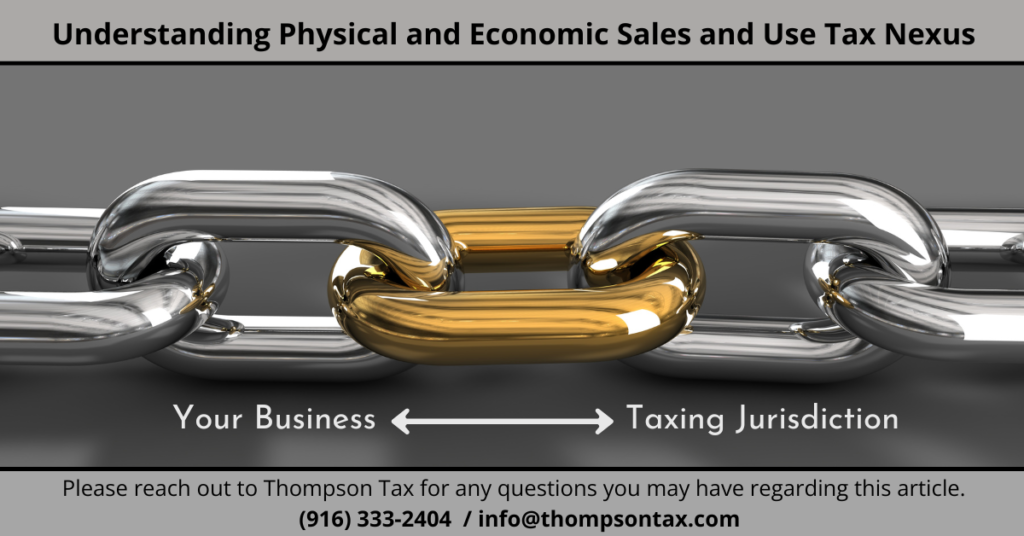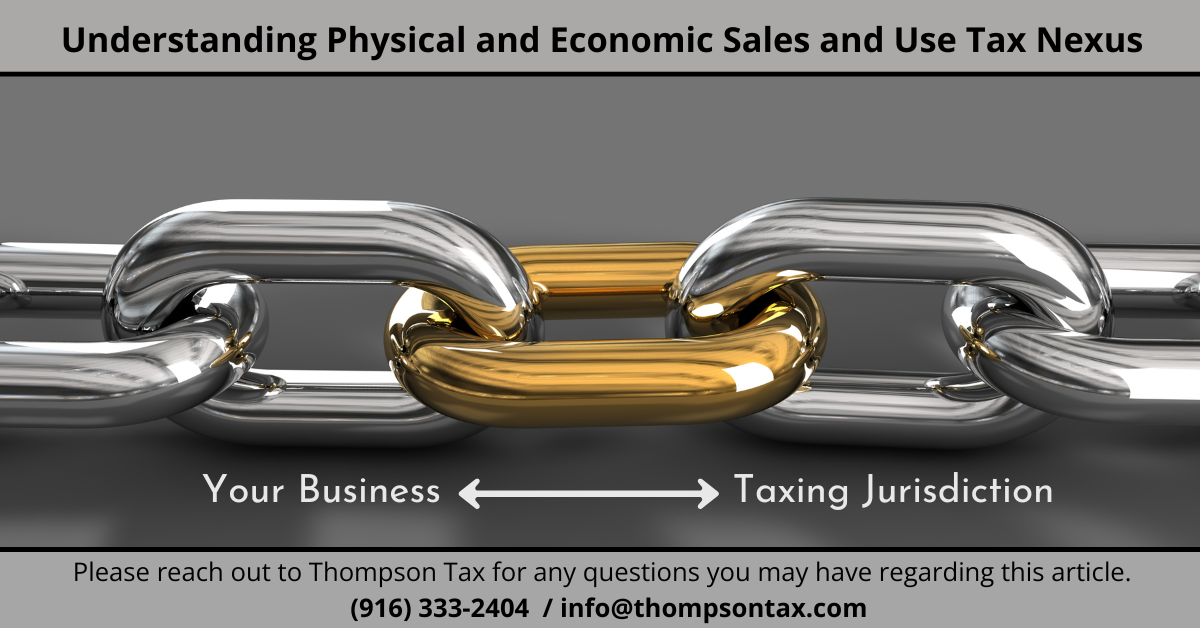Navigating the complex world of sales tax can be challenging, especially when it comes to understanding sales tax nexus criteria. Sales tax nexus refers to the connection or link a business has with a state that requires it to collect and remit sales tax on sales made within that state. With evolving regulations and changes in e-commerce, it’s crucial to stay updated on the specific sales tax nexus criteria that apply in different states. In this article, we’ll dive deep into the concept of sales tax nexus, how to determine if your business has it, and what it means for your tax obligations in 2024.
Also Read: State-Specific Use Tax Laws

What is Sales Tax Nexus?
Sales tax nexus is the legal term that refers to a business’s physical or economic presence in a state, which triggers the obligation to collect sales tax on sales made within that state. In simpler terms, nexus means that a state has the right to tax a business because the business has established a sufficient connection with that state.
The sales tax nexus criteria are set by each state, and they can vary widely. Some states may require a physical presence within the state, while others may apply economic nexus rules based on the volume of sales or the number of transactions conducted within the state.
Importance of Sales Tax Nexus Criteria
Understanding sales tax nexus criteria is vital for businesses of all sizes, especially with the rise of e-commerce and interstate commerce. Without a clear grasp of nexus, businesses risk failing to comply with sales tax laws, leading to audits, penalties, and back taxes.
Here are a few key reasons why sales tax nexus is important:
- Avoiding Penalties: Not collecting sales tax where required can lead to significant fines, interest, and potential audits.
- Compliance with State Laws: Each state has its own rules for sales tax nexus, and understanding them helps ensure that you’re adhering to local tax laws.
- Fair Competition: Nexus rules ensure that out-of-state businesses are not unfairly competing with local businesses that are required to collect sales tax.
- Protecting Your Business: Failing to understand the criteria could lead to unexpected tax liabilities that could significantly impact your cash flow and profitability.
How Sales Tax Nexus Criteria Are Established
Sales tax nexus is generally established by two types of criteria: physical presence and economic presence.
- Physical Presence Nexus: This is the traditional standard for establishing sales tax nexus. If your business has a physical presence in a state, such as an office, warehouse, or employees, you are generally required to collect sales tax in that state.
- Economic Nexus: This type of nexus has become more common in recent years, particularly after the U.S. Supreme Court’s decision in South Dakota v. Wayfair, Inc. (2018). Economic nexus is based on the amount of sales or the number of transactions a business makes in a state, regardless of physical presence. For example, if your business makes more than $100,000 in sales or completes more than 200 transactions in a state, you may be required to collect sales tax in that state.
Also Read: Appealing IRS Tax Decisions

Types of Sales Tax Nexus
There are several ways a business can establish nexus with a state:
- Physical Nexus: This is the most straightforward nexus, established by having a physical presence in the state, such as an office, retail location, or employees working within the state.
- Economic Nexus: As mentioned, economic nexus is based on sales volume or transaction thresholds. For example, if your business exceeds a specific sales threshold (e.g., $100,000 in sales or 200 transactions in a state), you may be obligated to collect sales tax.
- Affiliate Nexus: If your business has affiliates or related entities operating in a state, that could establish nexus. For instance, if you have a related company that sells your products in a state, that could create sales tax nexus for your business.
- Click-Through Nexus: Some states establish nexus if an online business has agreements with in-state businesses or affiliates that refer customers to the business in exchange for a commission. This is particularly relevant for e-commerce businesses with affiliate programs.
- Marketplace Nexus: Many states now require marketplace facilitators (like Amazon, eBay, or Etsy) to collect and remit sales tax on behalf of sellers using their platforms. In these cases, individual sellers may not need to worry about nexus directly but should understand the rules for marketplace sellers.
Sales Tax Nexus for Online Sellers
The rise of online shopping has led to significant changes in sales tax nexus criteria. Prior to 2018, online businesses were not required to collect sales tax unless they had a physical presence in the state. However, the Wayfair decision changed that, allowing states to impose sales tax obligations on businesses based on economic nexus.
As a result, many online sellers now have to comply with sales tax laws in multiple states. Online businesses should pay attention to each state’s economic nexus thresholds to avoid failing to collect tax when required.
For example, if an online seller exceeds $100,000 in sales or 200 transactions in a state, they would need to register to collect sales tax in that state, even if they have no physical presence there.
Sales Tax Nexus Criteria in 2024: What’s New?
In 2024, sales tax nexus criteria continue to evolve, particularly with more states adopting economic nexus laws. Here are a few key changes and trends businesses should be aware of:
- More States Adopt Economic Nexus: Following the Wayfair decision, nearly every state with a sales tax has adopted economic nexus laws. These rules are constantly updated to reflect changes in sales thresholds, so businesses must keep track of the regulations in each state where they operate.
- Increased Marketplace Facilitator Requirements: States are increasingly requiring marketplace facilitators to collect and remit sales tax on behalf of their sellers. If you sell through a marketplace, make sure you’re aware of the specific rules in your state.
- Multistate Nexus Compliance: Businesses operating in multiple states should consider using sales tax automation software to ensure compliance with the different nexus requirements across the country. These tools can help identify nexus thresholds and automate tax calculation and reporting.
How to Determine If Your Business Has Sales Tax Nexus
To determine whether your business has established nexus in a particular state, follow these steps:
- Evaluate Physical Presence: Check if your business has a physical presence in any state, such as a storefront, warehouse, office, or employees.
- Assess Economic Nexus: Calculate your sales and transaction volume in each state. If you exceed the state’s threshold, you will likely need to collect sales tax in that state.
- Review Affiliate and Marketplace Nexus: Look at your business’s affiliate relationships and marketplace sales to determine if these create nexus in any state.
- Monitor State Laws: Keep an eye on any changes to nexus laws in states where you conduct business. Nexus rules can change, and staying informed will help you remain compliant.
Also Read: Inheritance Tax Laws 2024

Consequences of Not Complying with Sales Tax Nexus Criteria
Failure to comply with sales tax nexus criteria can have serious consequences for your business:
- Penalties and Fines: States may impose hefty fines and penalties for failing to collect and remit sales tax.
- Back Taxes: Businesses may be required to pay back taxes for previous sales made in a state, often with interest.
- Audits: States may audit businesses to ensure they’re complying with sales tax laws, which can be a time-consuming and expensive process.
- Reputation Damage: Non-compliance with sales tax laws can harm your business’s reputation and relationships with state tax authorities.
Frequently Asked Questions (FAQs)
1. What is the difference between sales tax and nexus?
Sales tax is the tax imposed on the sale of goods and services, while nexus refers to the connection a business has with a state that requires it to collect sales tax.
2. How do I know if I have nexus in a state?
To determine if you have nexus, evaluate your physical presence, sales volume, or transactions in a state. If you exceed the thresholds set by that state, you may be required to collect sales tax.
3. What happens if I don’t collect sales tax in a state where I have nexus?
Failure to collect sales tax can result in penalties, back taxes, and potential audits. It’s essential to comply with nexus laws to avoid these consequences.
4. Can I collect sales tax on sales made through an online marketplace?
Yes, but many states now require marketplace facilitators like Amazon and eBay to collect sales tax on behalf of sellers. Ensure you understand your responsibilities as a seller.
5. Do nexus laws apply to all businesses?
Yes, nexus laws apply to all businesses that make sales in states where they have a connection, whether through physical presence or economic activity.
Conclusion
Understanding sales tax nexus criteria is essential for businesses in 2024. With evolving laws and a growing reliance

1 thought on “Sales Tax Nexus Criteria: A Detailed Guide for 2024”